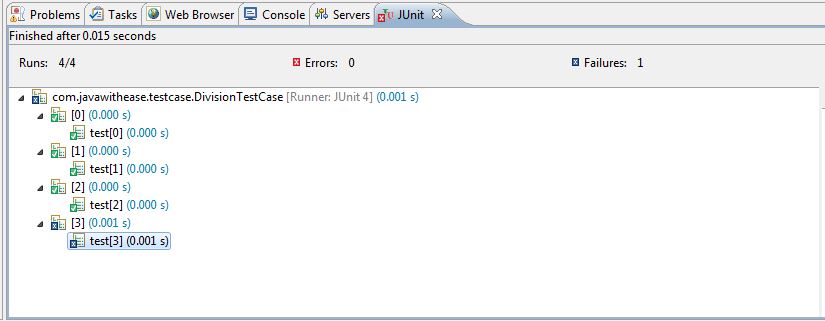The parameterized test is a new feature introduced in JUnit 4. It provides the facility to execute the same test case again and again with different values.
Steps to create a parameterized test:
1. Test class have to be annotated with @RunWith(Parameterized.class) annotation.
2. Create a public static method with @Parameters annotation which returns a collection of objects as test data set.
3. Create data members for each column of test data set.
4. Create a public constructor which takes one object of test data set.
5. Create test case using test data set.
Example:
DivisionTestCase.java
import java.util.Arrays; import java.util.Collection; import com.w3schools.business.*; import org.junit.Before; import org.junit.Test; import org.junit.runners.Parameterized; import org.junit.runner.RunWith; import static org.junit.Assert.assertEquals; /** * This is test case class for parameterised test case. * @author w3schools */ @RunWith(Parameterized.class) public class DivisionTestCase { private int num1; private int num2; private int expectedResult; private DivisionTest divisionTest; //Constructor that takes test data. public DivisionTestCase(int num1, int num2, int expectedResult){ this.num1 = num1; this.num2 = num2; this.expectedResult = expectedResult; } //called before every test case. @Before public void initializeDivisionTest() { divisionTest = new DivisionTest(); } //It will initialise parameters every //time trigger executes. @Parameterized.Parameters public static Collection primeNumbers() { return Arrays.asList(new Object[][] { { 10, 2, 5 }, { 20, 5, 4 }, { 20, 10, 2 }, { 40, 10, 20 } }); } //Test case for division @Test public void test() { System.out.println("Parameterized Numbers: num1 = " + num1 + ", num2 = " + num2); assertEquals(expectedResult, divisionTest .division(num1, num2)); } } |
DivisionTest.java
/** * This is simple java class containing division method. * @author w3schools */ public class DivisionTest { //division method public int division(int num1, int num2) throws ArithmeticException{ return num1/num2; } } |
Output:
Parameterized Numbers: num1 = 10, num2 = 2 Parameterized Numbers: num1 = 20, num2 = 5 Parameterized Numbers: num1 = 20, num2 = 10 Parameterized Numbers: num1 = 40, num2 = 10 |

Download this example.
Next Topic: Junit test runner.
Previous Topic: JUnit suite test.